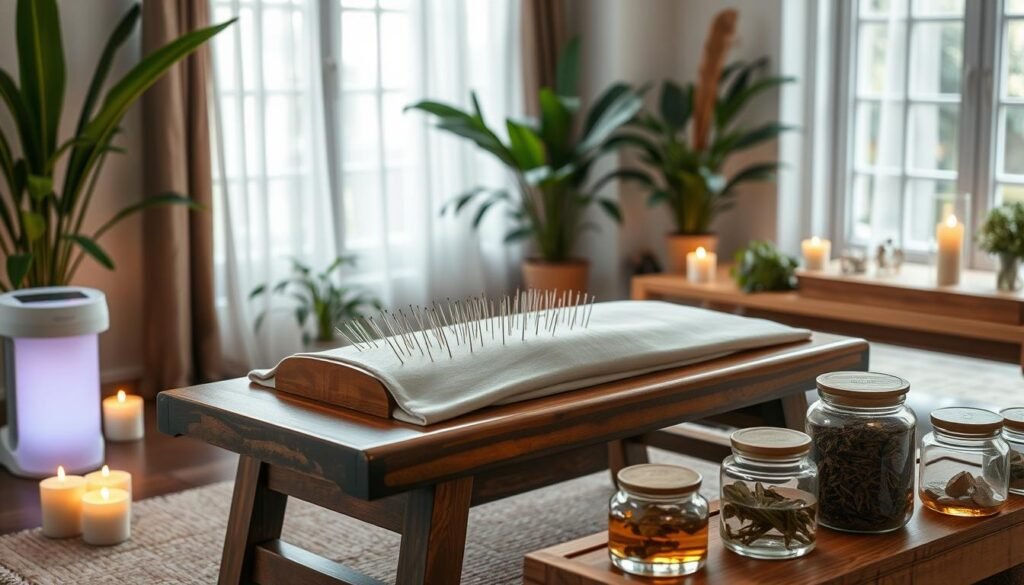About 50 million men and 30 million women in the U.S. are dealing with hair loss. This high number shows a great need for effective treatments. Recently, there’s been a big interest in holistic ways to fight hair loss. These methods aim not just to stop hair loss but also improve overall well-being. We’ll look into alternative treatments for hair loss, like acupuncture, laser therapy, and herbal remedies.
People now want treatments that support traditional methods. They’re looking at ancient practices and modern scientific findings. We’ll check out different alternative options, their history, scientific backing, and how they help with hair loss. Acupuncture, for example, has been effective for some types of hair loss by targeting specific points on the body. Details on these studies can be found here. Also, knowing about hormonal imbalances is important, as explained here.
Key Takeaways
- Alternative therapies for hair loss are gaining popularity as effective options.
- Holistic hair loss treatments encompass various natural remedies and methods.
- Acupuncture targets specific acupoints to potentially benefit hair growth.
- Understanding hormonal imbalances is key to effective hair loss treatment.
- Innovative therapies like laser treatment offer modern solutions for hair restoration.
Understanding Hair Loss
Millions of people in the U.S. are dealing with hair loss. It affects their confidence and overall happiness. The causes of hair loss vary from genetics to lifestyle changes, health issues, and hormones. Knowing these causes is key in identifying the type of hair loss and finding the right treatments.
Some common types are androgenetic alopecia, known as pattern baldness, and alopecia areata, which causes patchy hair loss. Another type is telogen effluvium, leading to temporary hair fall due to stress or hormonal shifts. It’s important to understand each type may need a different treatment approach.
Statistics indicate about 80 million people in the U.S. experience hair loss. This issue can deeply impact one’s mental and emotional state. Being informed about the factors contributing to hair loss allows people to make smart choices for their hair care. For those looking to tackle hair loss, talking to healthcare providers and exploring treatment options is advisable.
| Hair Loss Type | Description | Common Causes |
|---|---|---|
| Androgenetic Alopecia | Progressive hair thinning on the scalp. | Genetics, hormonal changes. |
| Alopecia Areata | Patchy loss of hair, often in circular patterns. | Autoimmune disorders, stress. |
| Telogen Effluvium | Temporary hair shedding usually caused by stress. | Physical or emotional stress, hormonal fluctuations. |
What are Alternative Therapies?
Alternative therapies are varied practices aimed at boosting health and well-being in non-traditional ways. They focus on the whole person—mind, body, and spirit. This differs from traditional methods that often target only symptoms. This holistic approach is part of integrative medicine. It combines standard and alternative treatments.
People turn to alternative therapies for issues like hair loss. Acupuncture, naturopathy, and osteopathy are popular options. Each has its own philosophy and methods to better overall health, not just treat symptoms.

Alternative medicine is not just for hair loss. It covers conditions like chronic pain, stress, and digestion problems. With a holistic health view growing in popularity, people are seeking different ways to improve wellness. They use herbs, mind-body exercises, and lifestyle changes to boost well-being.
| Alternative Therapy | Focus Area | Common Practices |
|---|---|---|
| Acupuncture | Energy flow and balance | Needle insertion, pressure points |
| Naturopathy | Natural healing | Herbal remedies, diet changes |
| Osteopathy | Musculoskeletal health | Physical manipulation, mobility exercises |
| Homeopathy | Individual responses | Highly diluted substances, personalized care |
| Meditation | Mental well-being | Mindfulness, breathing exercises |
Exploring alternative therapies opens up new treatment possibilities. Those facing hair loss or other health issues might find new hope. By combining different methods, you can create a unique plan to improve health and vitality.
Exploring Alternative Therapies for Hair Loss
Hair loss can be very upsetting, making people look for helpful solutions. Alternative therapies offer different methods that may work well with traditional treatments. They focus on natural remedies, changing lifestyle, and connecting the mind and body. There are many techniques for hair restoration. It’s important to know the benefits of each to choose the best one.
Acupuncture is known for helping hair grow and making the scalp healthier. It uses special points in the body to improve blood flow. This might feed the hair roots well. Some research shows that acupuncture really works for growing hair back.
Herbal treatments are also quite popular, using plants as remedies. Plants like saw palmetto and ginseng might block hormones that cause hair to fall out. Making these treatments at home is easy, needing only a few ingredients. To learn how hormones affect hair loss, check out this link.
Essential oils are promising in the natural health world too. Oils such as rosemary and peppermint are known for boosting hair growth and making it thicker. These oils can be added easily to your daily hair care through several ways.
Looking into alternative therapies gives people more options for fixing their hair loss. By exploring everything from acupuncture to herbs and essential oils, you can make smart choices about your hair health.
| Therapy Type | Method | Effectiveness | Notes |
|---|---|---|---|
| Acupuncture | Inserting needles at specific points to enhance blood flow. | Promising results in studies for hair growth. | May help in reducing stress and balancing hormones. |
| Herbal Treatments | Using natural extracts to inhibit hormone effects. | Varied; some herbs show stronger results than others. | Easy to prepare at home. |
| Essential Oils | Topical application to stimulate hair follicles. | Generally positive, especially with consistent use. | Safe and versatile for daily use. |
Acupuncture: Ancient Wisdom for Modern Hair Loss
Acupuncture comes from traditional Chinese medicine. It’s been used for thousands of years. This therapy is based on the idea of qi, or life energy. It flows through points in our body called meridians.
Maintaining qi’s flow is key for good health. This includes keeping your scalp and hair healthy.
History and Principles of Acupuncture
In the past, acupuncture treated many health issues, including hair loss. Needles are placed in specific points to help the body heal itself. These points are linked to hair growth. This fascinates both patients and those who practice it.
As people look for alternative treatments, acupuncture for hair loss is getting popular. It draws on traditional methods honed over centuries.
Scientific Evidence Supporting Acupuncture
Recent studies shed light on acupuncture’s benefits for hair growth. They show it boosts blood flow to the scalp. This could make hair follicles healthier.
Research published in journals points to the positive effects of acupuncture for hair loss. Combining it with other treatments might improve results. This reflects a holistic treatment approach.
Herbal Treatments for Hair Loss
Herbs are known for making hair grow better. People often use herbs to prevent hair loss. They want a natural way to boost their hair’s health. Some herbs can make hair follicles stronger and grow faster. This means people can find natural remedies that are good for their hair and well-being.
Popular Herbs Used for Hair Growth
Many herbs are famous for helping hair health. Here are some well-liked ones:
- Saw Palmetto: Known for inhibiting the production of DHT, a hormone linked to hair loss.
- Rosemary: Often used for its stimulating effects on blood circulation to the scalp, promoting healthier hair.
- Ginseng: Believed to encourage hair growth by improving the overall health of hair follicles.
Using these herbs is a way to try different natural hair loss treatments. This can make your hair care routine better with nature’s help.
How to Create Herbal Remedies at Home
Making DIY herbal remedies for hair growth is fun and fulfilling. Here are some easy ways to make them:
- Herbal Infused Oil: Combine dried herbs like rosemary or ginseng with a carrier oil. Olive or coconut oil works well. Keep the mix in a warm place for a few days then strain it. Use it on your scalp to help your hair.
- Hair Rinse: Put saw palmetto or rosemary leaves in boiling water. After it cools, use it as a rinse after shampooing. It helps your hair shine and stay healthy.
- Hair Mask: Mix ginseng powder with water or yogurt to make a paste. Apply this to your scalp and hair. Leave it for 30 minutes, then rinse well. It refreshes your hair.
DIY herbal solutions can turn your daily hair care into self-care. They help your hair grow healthy.

Essential Oils and Their Effects on Hair Health
Essential oils have become a key tool for healthy hair. Many are turning to these natural solutions for their hair care. The benefits go beyond smell, affecting hair growth and scalp health.
Top Essential Oils for Hair Loss
Several essential oils shine in the fight against hair loss. They boost blood flow, fight inflammation, and keep the scalp healthy. Here’s a look at some top oils:
- Lavender Oil: It’s soothing and may help hair grow. Stress, which impacts hair loss, can be reduced too.
- Peppermint Oil: By improving circulation, it brings more blood to the hair roots. It helps hair grow stronger.
- Cedarwood Oil: Known for its calming effects, it also balances scalp oil production. This creates a better environment for hair to grow.
- Rosemary Oil: Linked to folic acid benefits, it boosts circulation and encourages hair to grow.
- Tea Tree Oil: With its antifungal properties, it keeps the scalp clean. This prevents growth hindrance.
Methods of Application
Knowing how to apply essential oils is key for hair care. Here are the best ways to do it:
- Direct Scalp Application: Mix essential oils with a carrier oil like jojoba or coconut to avoid skin irritation. Then, apply directly to your scalp.
- Aromatherapy Massages: Scalp massages with essential oils boost blood flow. They also help you relax, benefiting your mood and hair.
- Shampoo or Conditioner Infusion: Adding a few drops of essential oil to your shampoo or conditioner gives your hair extra care.
- Hair Masks: Create hair masks with essential oils and natural ingredients like honey. This provides extra moisture and care for your hair.

Using essential oils in your natural hair care routine can bring great results. Aromatherapy doesn’t just make your hair look good. It can also improve your overall health.
Laser Treatment: A Cutting-Edge Solution
As technology gets better, low-level laser therapy is now a leading method for hair loss. This method uses special light wavelengths to wake up hair follicles. It helps hair grow thicker and denser. Many people love using laser cap treatments to make thinning hair better.
FDA-approved hair loss treatments, like low-level laser devices, have proven successful. Studies in well-known journals show these devices really improve hair thickness and scalp health. Laser caps and combs are especially popular for easy home use. They help people strengthen their hair care routine.
Low-level laser therapy works by boosting cell activity in hair follicles. This leads to more blood flow and energy, making hair healthier and thicker. People find laser cap treatments simple to use. They easily fit them into their daily life without any hassle.
Holistic Hair Loss Treatments Beyond the Conventional
The link between your mind’s health and your hair’s health is getting noticed more. Stress plays a big role in how your hair grows. It messes with your body’s hormones and can cause more hair to fall out. Finding ways to manage stress is key if you’re losing hair. Practices like meditation and yoga can help chill you out. They make you feel good overall. By doing these, you might lower your stress and help your hair grow by keeping your mind balanced.
Mind-Body Connection in Hair Health
Looking at hair loss in a whole-body way means seeing how your mental health affects your hair. Learning to handle stress through deep breathing and moving your body can help fight hair loss. Adding these habits into your daily life might help if your hair is thinning.
Dietary Changes and Nutritional Support
What you eat plays a huge part in hair growth. You need a diet full of vitamins and minerals to keep your hair healthy. Things like biotin, zinc, and iron are super important for your hair roots and how your hair grows. Eating lots of fruits, veggies, lean meats, and good fats can make your hair better. If you want to dig deeper into how eating right helps your hair, check out academic studies. They show that eating well and managing your stress both help keep your hair strong.
Non-Traditional Therapies: From Scalp Massage to PRP
Non-traditional therapies are becoming key in finding new hair restoration methods. Many people are now looking into the benefits of scalp massages and the technology behind platelet-rich plasma (PRP) therapy. These treatments are gaining popularity for their potential to boost hair growth and improve scalp health.
Scalp massage is an easy yet effective method to boost blood flow, possibly stirring hair follicles into action. It’s not just good for your hair; it’s a stress-buster too. Regularly massaging your scalp can make a big difference in your hair’s health.
Platelet-rich plasma therapy is a breakthrough in giving hair a new lease on life. It starts with taking a little blood, spinning it to get platelets, and then putting them back into the scalp. This could help bring back hair thickness and spark new growth, showing the power of advanced hair treatments.
When you mix scalp massages and PRP therapy, you get a strong combo for hair restoration. For those struggling with hair loss, these non-traditional methods could really kickstart your hair’s comeback. It’s worth looking into for anyone wanting to improve their hair growth.
| Therapy | Method | Benefits |
|---|---|---|
| Scalp Massage | Manual pressure and kneading of the scalp | Increased blood circulation, stress relief, and hair follicle stimulation |
| Platelet-Rich Plasma (PRP) Therapy | Extraction of blood, processing to concentrate platelets, injection into scalp | Enhanced hair growth, thickness improvement, and utilization of the body’s natural healing |
Conclusion
As we wrap up our look at alternative hair loss treatments, it’s clear they offer many solutions. These methods are made to meet personal needs. This means you can manage your hair health in a way that suits you best. Acupuncture and herbal remedies show how diverse these options are, sparking creativity in dealing with hair loss.
It’s important to keep an open mind about all treatment types, both new and old. Mixing various approaches might bring the best outcomes. This holistic way can make you feel in control of your hair’s health. Trying different treatments can be empowering. It lets you explore and make discoveries on your journey to healthier hair.
Hope is very much alive for those looking to restore their hair. Continuous advancements in research help us understand hair loss better. With the right combination of treatments tailored to you, finding a way back to healthy hair is possible. The journey is filled with chances for improvement and new beginnings.